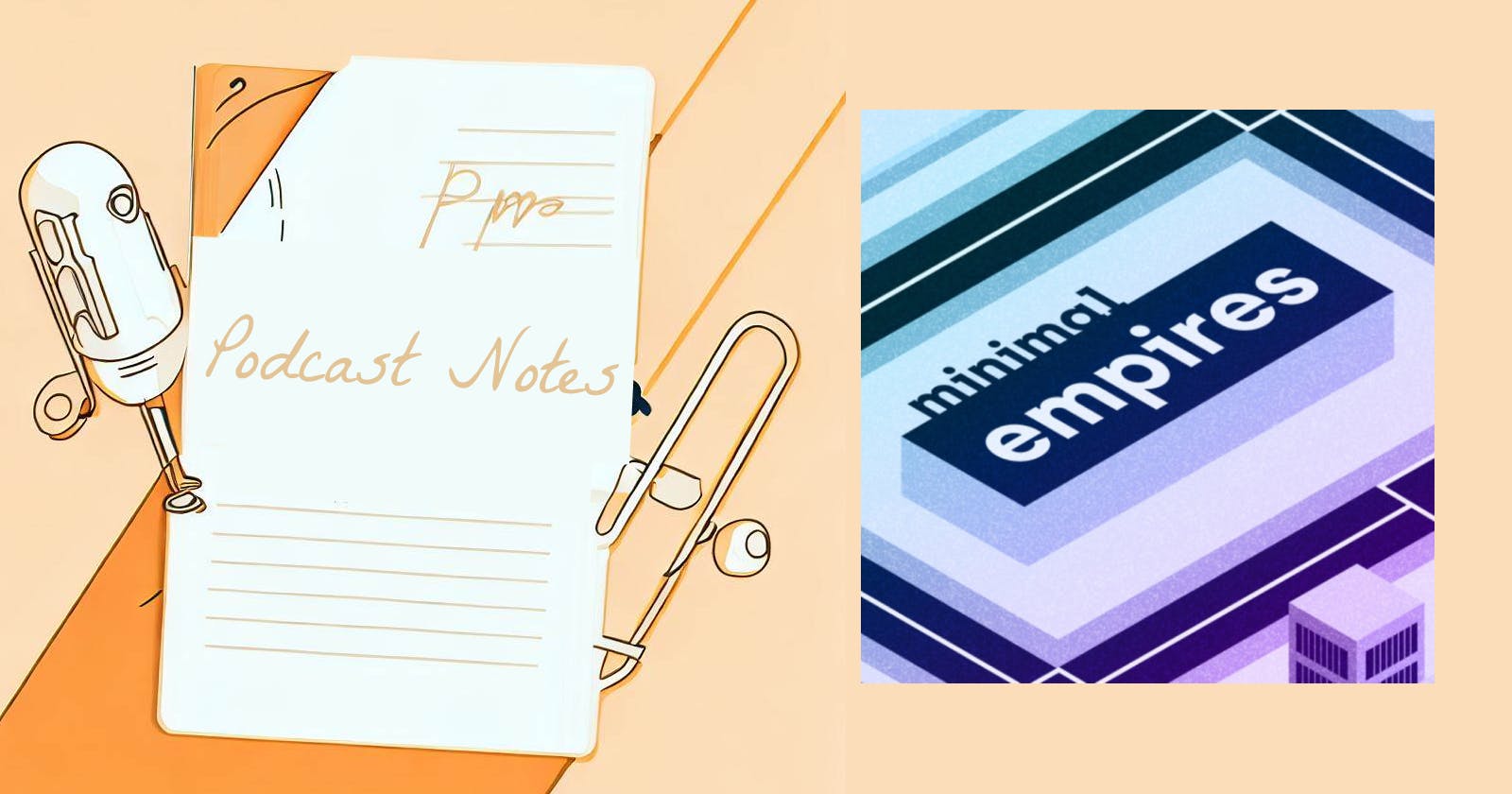Podcast Notes: Minimal Empires
My podcast notes from Minimal Empires podcast, covering topics like SaaS, finding ideas, motivation, business structures, goal-setting, and more.
Table of contents
- Links
- My Notes
- E2 – How do I find an idea for founding, bootstrapping, or as a side hustle?
- E3 – Don't start a side hustle without considering this!
- E5 – 12 Startups and How They Can Get Their First Customer
- E6 – Motivation: Stay motivated and keep motivating
- E7 – Tips and methods for maximizing revenue
- E8 – Taking calculated risks as a small business owner
- E9 – This is how bootstrappers survive and thrive despite recession
- E10 - Which business structure is suitable? My thoughts and my legal setup
- E11 – How I set personal and business goals + my 2023 goals
- E14 – 6 Reasons Why You Haven't Started Your Business Yet
- E15 – Open Startup: Advantages, Disadvantages - is the era over?
- E16 – Successful Side-Hustle: Time Management Strategies for Entrepreneurs
- E17 – Top Business Models for Solopreneurs or Solo-Founders
By Sumit Kumar who is the founder of Parqet and has previously worked at Stripe.
Today, all it takes is the internet to build a business empire that completely changes our lives - we just have to open our laptops and get started - That's what the Minimal Empires Podcast is all about. Whether you're an indie hacker, startup founder with investors, solo entrepreneur, bootstrapper, or side hustler - Minimal Empires helps founders with idea and co-founder discovery, business model validation, company formation, scaling, and exit by sharing experiences and learnings from successful founders. Each episode is packed with valuable tips.
Good luck with your venture!
(Translated with Hashnode AI)
Links
Podcast on Spotify, on Apple Podcasts
My Notes
E2 – How do I find an idea for founding, bootstrapping, or as a side hustle?
Find a small niche that offers a large "piece of the cake"
- For example, Plausible, Fathom, etc. vs. Google Analytics -> Privacy, Simplicity
Narrow down the niche, e.g., by geography, age, occupation, language, etc
Ultra-small niche can be expanded later
Helpful: Be part of the niche yourself (In which "bubble" / scene am I?)
- What do people complain about? What are the pain points?
Book recommendations: The Millionaire Fastlane, The Great Rat-Race Escape
Definitely take your partner on the entrepreneurship journey
- Why do I want this? What do I imagine?
Some Ideas
Website for sending faxes (including API)
Content: Expert in something (e.g., software: Linear, Supabase, Auth0, ... or hardware: vacuum cleaner, stove, keyboard) -> produce content and SEO affiliate and/or advertising
Analytics for registered users (auth provider; dashboard):
- When do users log in? How often? How long? Retention? Devices? Which login is used?
Camera that streams a 24/7 food bowl (e.g., squirrel or bird) on Twitch, every tip = dispense food
E3 – Don't start a side hustle without considering this!
- How much revenue do I need to make to work full time on my project? How many customers do I need at what price?
E5 – 12 Startups and How They Can Get Their First Customer
| B2B | B2C (other "Indie Hackers") |
| "we" | "I" |
| professional | personal, sympathetic |
| do not want to be the first customer | want to support other Indie Hackers |
Niche first, then expand
Focus on one social channel
Where do the users hang out? Reddit? Twitter? Be active, build a reputation, don't sell directly
Start with free, feedback is everything, make calls: "How are you currently doing it?", "What are your pain points?", Book: Mom Test
Make a focused landing page, demos, GIFs, demo-account
Exposure: post on Twitter, GIFs, using the tool, etc.
E6 – Motivation: Stay motivated and keep motivating
Where do I want to go? Work backward from the goal so I know what it's for
Have a "compass"; not aimlessly in one direction
What would my ideal daily routine look like if money wasn't an issue?
If you enjoy the journey, you can achieve a lot. Reaching the goal gives a dopamine boost but quickly drops off; don't celebrate achieving goals too much
E7 – Tips and methods for maximizing revenue
Take the price you had in mind and double or triple it; people tend to lean towards pricing too low.
No more than 3 tiers.
Price the highest tier very high, so the middle one seems affordable (somewhat contradicts the popcorn pricing model in movie theaters).
💡This somehow contradicts the popcorn pricing model in cinemas: Pricing the high tier close to the middle tier so that everybody thinks the top tier is a good deal because it is only slightly more expensive.Experienced a significant revenue boost when prices were removed from the website (B2B); could set individual prices and adjust them constantly.
Never offer "unlimited" of anything; it takes away the possibility of introducing higher tiers or add-ons.
Better to be a boutique with fewer customers and higher prices; less effort for support, etc., and generally less stressful customers.
Recommendation: Designing the Ideal Bootstrapped Business with Jason Cohen
E8 – Taking calculated risks as a small business owner
There are many legal "hurdles"
Not fulfilling everything from the beginning (e.g., cookie banner or correct legal notice/privacy policy); it's pointless if there are no customers yet; but it's a consciously taken risk
These things are on the to-do list but don't have a high priority
E9 – This is how bootstrappers survive and thrive despite recession
Build cash reserves; save costs
Invest in marketing to attract customers
Reduce or stop discounts, as these customers often leave quickly, which is especially undesirable during a recession
Additional revenue streams
Increase prices
E10 - Which business structure is suitable? My thoughts and my legal setup
Sumit has a Holding (UG) & Incubator (UG) & Parquet (GmbH)
Exit the incubator in a timely manner, as otherwise, there will be high taxes (if approaching 10,000 EUR per month) or restructure the incubator and create a new one
Holding also has real estate, investments, shares, etc.
Real estate: The company can also buy property (can be purchased from the company's gross income) and rent it out cheaply (about 30% below market) to the owner
GmbH for the company when partnerships are important (reputation); with Parquet: with banks
Sumit would always go directly for UG instead of GbR if serious
Holding structure is only worthwhile if serious and initially comes with costs (e.g., for tax consultants)
If planning to emigrate, a different setup is better (with GmbH & Co. KG)
YouTube recommendation: Warum die DOPPELTE HOLDING die beste Rechtsform ist! Steuerberater Christoph Juhn (the channel in general)
E11 – How I set personal and business goals + my 2023 goals
Personal
lifetime goals, have North Stars
"shoot for the stars and reach the moon" (not necessarily for habits)
build habits
- start small, e.g. create time and go to bed early before a huge morning routine, or go to the gym first instead of training for 1 hour 5x a week right away
when the habit is established
already "on-track"
maybe more challenges, e.g. 200kg deadlift, or running a marathon etc.
Business
not directly targeting revenue or profit
- can favor bad decisions
Goals that favor good decisions and indirectly lead to profit, e.g. number of customers
E14 – 6 Reasons Why You Haven't Started Your Business Yet
1) Legal hurdles: Register trademark? Start a company?
First focus on initial customers
Some legal things can be focused on later (e.g. cookie banner)
A corporation can be backdated (but invoices already issued)
Just get started
2) Imposter: Me/Product not enough
It's good enough for someone; it doesn't have to be the best
Big-Bang a la Apple products not good for bootstrappers; start imperfectly
3) Fear that idea will be stolen
The idea on its own has no value, execution matters
Hundreds of others probably have the same idea; but who implements it?
Don't be afraid of building in public
4) Can't build the product / I lack a skill
No money yet to hire a developer or similar
2 options:
Learn it yourself
Co-Founder
2 important skills needed: Tech + Sales/Marketing
5) Have many ideas & can't decide
Possibly test 12 startups in 12 months or similar; ideas with product-market fit will emerge
Again: Idea has no value without execution
Just start with one
6) Don't know if anyone would buy it / if the idea makes sense
Validate product beforehand
Book "The Mom Test"
Don't ask friends & family if the idea is good
The best validation is payment data; possibly collect payment data on a landing page until enough is available and then start
Instead of asking if the idea is good / makes sense, ask questions about the problems to be able to offer a better solution
E15 – Open Startup: Advantages, Disadvantages - is the era over?
Open Startup: Sharing company metrics openly (e.g. revenue, profit, churn, MRR, employee salaries, etc. etc.). Not everything needs to be published; for example, Parqet does not publish churn.
Example company: Ghost
Advantages
Trust
Accountability
Community
Content
Disadvantages
Encouragement for copy-cats & competitors
Insights that competitors can use
With poor numbers: harmful to trust
TLDR; Advantages outweigh disadvantages, especially in the beginning. Eventually, disadvantages increase and advantages decrease.
E16 – Successful Side-Hustle: Time Management Strategies for Entrepreneurs
Know your "Why": Extra income? A salary increase would be easier. As a first step into full-time business? What should your ideal day look like?
Get your partner on board; partner must know the "Why". There will be sacrifices (in relationships, etc.) to start/grow the side hustle.
Use the time when you have energy and leave the employer "the rest"; better to hustle before work rather than after with the remaining energy.
Where does the time come from?
- Reduce consumption time; possibly go to bed earlier if unproductive in the evenings and then get up earlier.
E17 – Top Business Models for Solopreneurs or Solo-Founders
It doesn't have to scale exclusively through time; not 10x income through 10x time; there's a limit
B2C is more difficult than B2B, as customer support can consume a lot of time
boutique more suitable than cheap
Suitable: content (newsletter, YouTube, blog), affiliate, SaaS, plugins (e.g. WordPress, Shopify, etc.)


